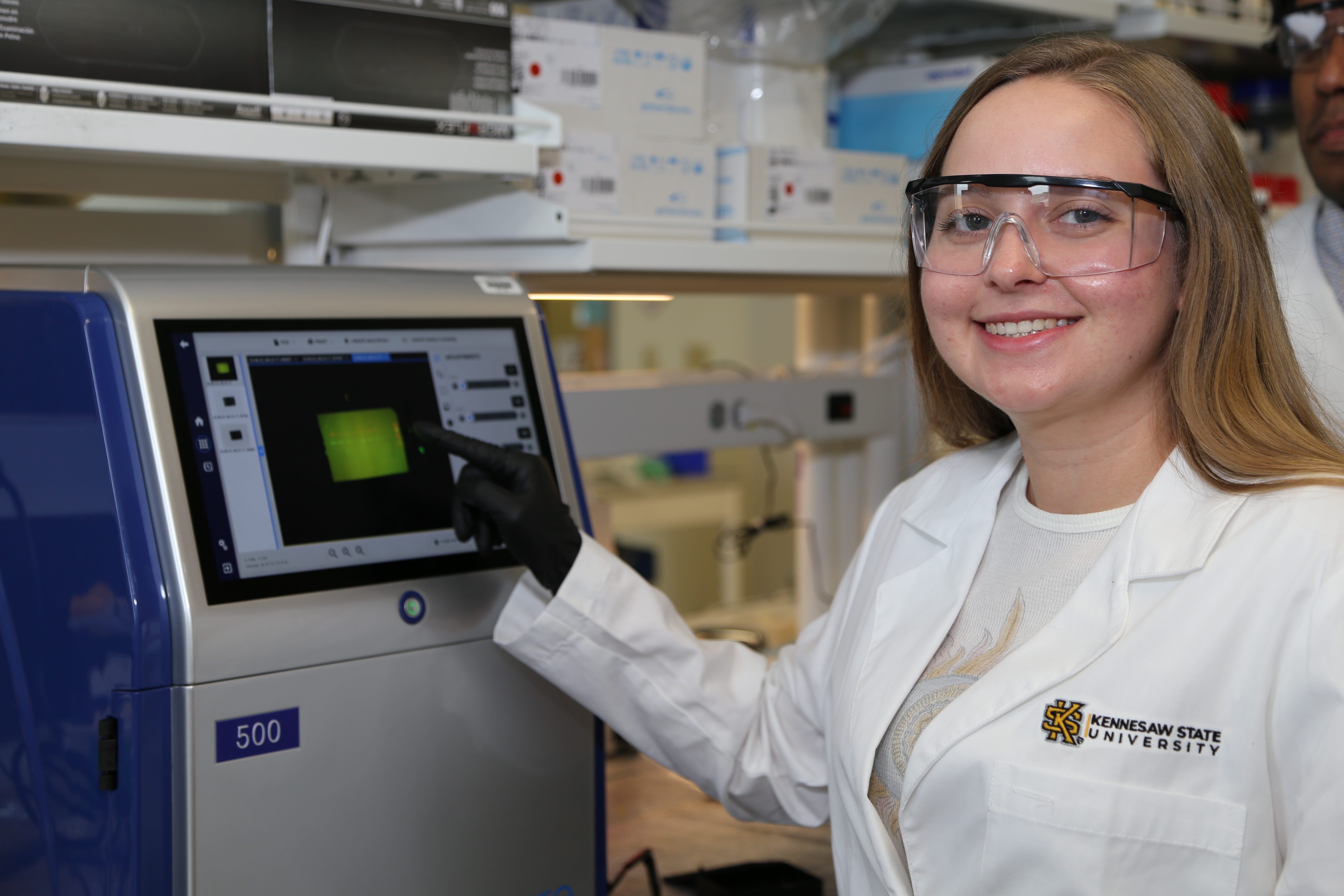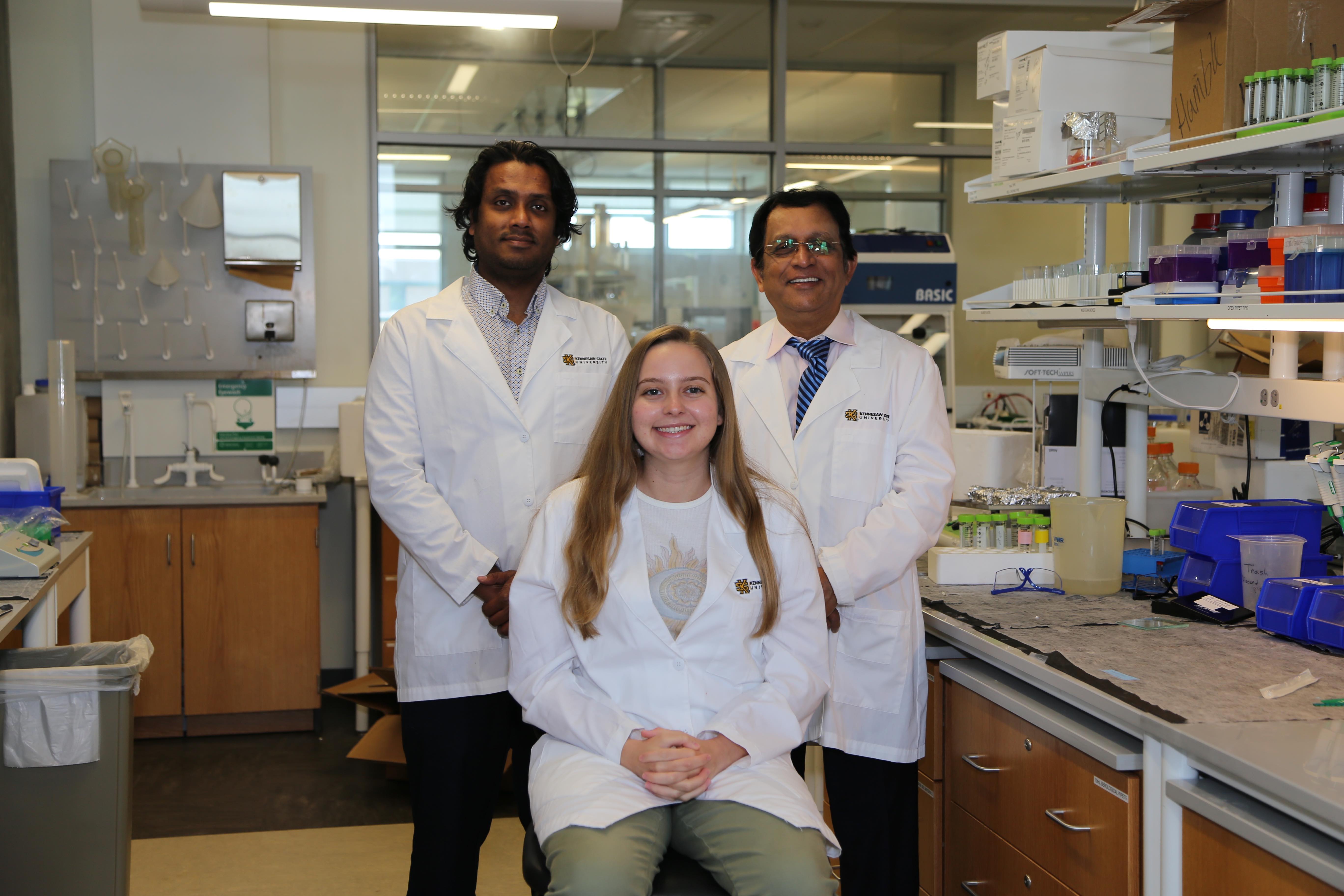Talon’ted Undergraduate Researcher - Katie Moerschel
KENNESAW, Ga. | Dec. 5, 2023
Katie Moerschel is an undergraduate student at Kennesaw State University who is working
toward her bachelor’s degree in biology.

Moerschel works in the Bioinnovation Lab, where she studies different candida species, and in Dr. Vishnu Suppiramaniam’s neuroscience lab, where she researches the effects of prenatal exposure to cannabis.
Q: What is your hometown and what high school did you attend?
A: I grew up in Suwanee, Ga., and I went to Lambert High School.
Q: What is your major and class year?
A: I'm a senior with a major in biology.
Q: Why did you decide to attend KSU?
A: I wanted to stay in state for school and I took a campus tour. I really loved the campus and thought there were a lot of opportunities to get involved.
Q: How long have you been working in research?
A: A little over a year now. But I’ve been at the neuroscience lab I’m working at for around nine months.
Q: What are you working on right now?
A: I’m working in two labs right now, with the first being the Bioinnovation Lab where I am studying Candida species and classifying them with machine learning. The second lab is Dr. Vishnu Suppiramaniam’s neuroscience lab, and this is where I spend most of my time. I’m currently studying the effects of prenatal cannabis exposure on a baby’s brain development.
-
“Talk to your peers and to your professors. Your professors work alongside other researchers, so they might know other staff members that need people in their lab, even if they don’t have any positions open in their lab. By starting that conversation, you could potentially get yourself a spot. Don’t be afraid to reach out because they want to work with you”
Q: What does an average day look like for you?
A: Over the summer I was in the Birla Carbon Scholars program, which fully funded me to work full-time doing research in Dr. Suppiramaniam’s lab.
I would typically get to the lab around 9 a.m. and start preparing my samples and gels. Gels are what we use for gel electrophoresis, which is a way of separating DNA, RNA, and proteins based on their molecular weight.
After preparing them, I would run the samples and go to lunch. When I came back, I would transfer my gel and then leave it overnight for 16 hours, at which point I would begin working on incubating antibodies on the membrane.
Q: Why do you feel that your research is important?
A: My research is important because there's been an increasing number of women who consume or have consumed cannabis during their pregnancy to alleviate morning sickness.
Morning sickness predominantly occurs during the first trimester, which is when significant parts of a baby's brain development is happening, so there is a possibility of learning and memory deficits occurring.
We’re basically trying to study how prenatal cannabis is affecting babies, and whether it is contributing to disorders such as Autism Spectrum Disorder and Attention Deficit Disorder.
Q: What would you say your greatest challenge in research has been?
A: I would say the greatest challenge for research is trying to find a lab to work in, and it's sometimes hard to find opportunities to get involved. At least that’s how I felt at first, but once I started to branch out and talk to people more, I realized there were more opportunities than I thought.
Q: What has been your greatest success?
A: Definitely being a part of and winning top poster presentation the Birla Carbon Scholars Symposium in August 2023.
Q: What is your favorite thing you've learned through your research has been?
A: I learned recently from my primary investigator that every time you get mad, your brain cells actually die because there's an increase in cortisol. Cortisol is a hormone that increases with stress, so I've learned to try to chill and not get as mad at things. I want to spare my brain cells, and I don’t want to get dumber in the process.
Q: What advice would you give to current students who may be curious about getting involved in research?
A: Talk to your peers and to your professors. Your professors work alongside other researchers, so they might know other staff members that need people in their lab, even if they don’t have any positions open in their lab. By starting that conversation, you could potentially get yourself a spot. Don’t be afraid to reach out because they want to work with you.
Q: What are you planning to do after you graduate?
A: I am going to be working full-time as a neuroscience research specialist at the Emory School of Medicine. I want to take some time off school before I start pursuing a PhD in neuroscience.
Story by Alyssa Ozment
Photos by Sara Franka












